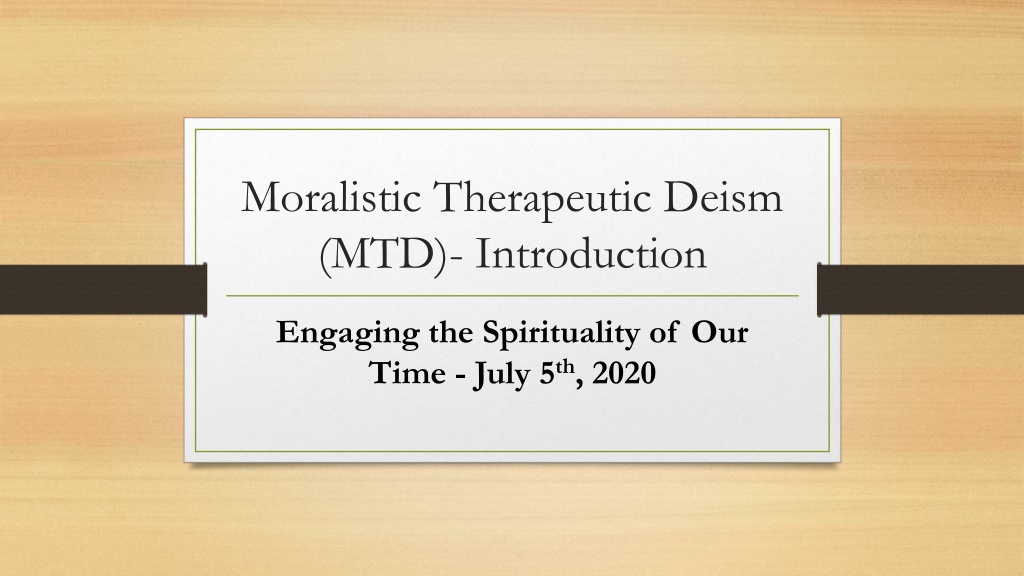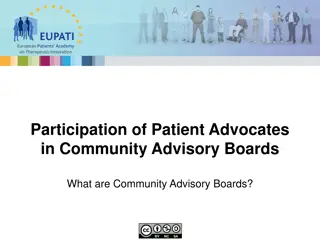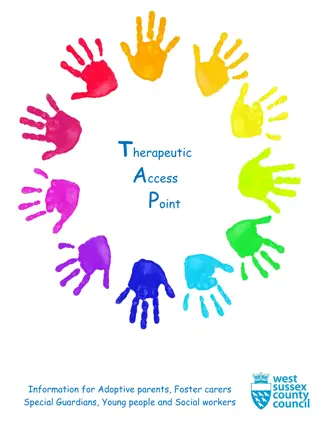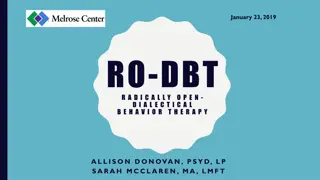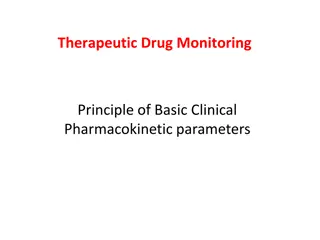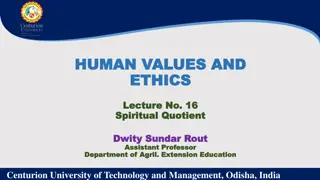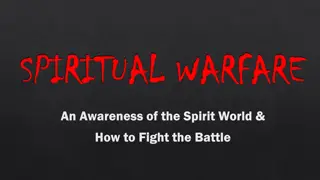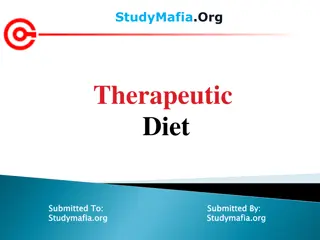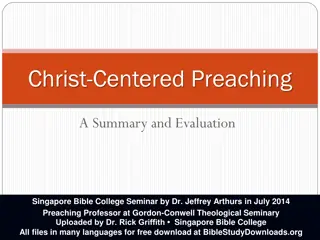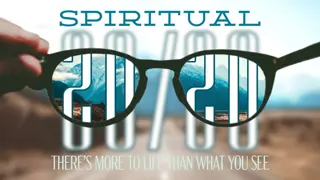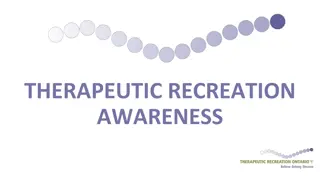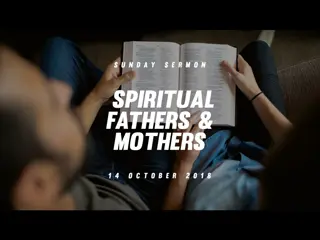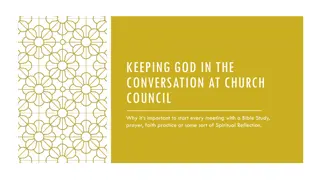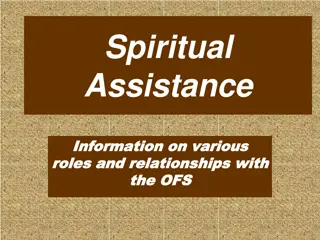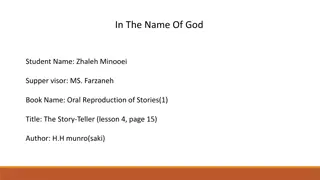Exploring Moralistic Therapeutic Deism (MTD) - A Contemporary Spiritual Perspective
Delve into the concept of Moralistic Therapeutic Deism (MTD) introduced by Christian Smith, exploring its components of Deism/Theism, Moralistic beliefs, and Therapeutic aspects. Discover how MTD shapes the spirituality of American teenagers through the insights of the National Study of Youth and Religion conducted at the University of North Carolina. Uncover the findings and implications of this research on contemporary religious and spiritual practices.
Download Presentation

Please find below an Image/Link to download the presentation.
The content on the website is provided AS IS for your information and personal use only. It may not be sold, licensed, or shared on other websites without obtaining consent from the author. Download presentation by click this link. If you encounter any issues during the download, it is possible that the publisher has removed the file from their server.
E N D
Presentation Transcript
Moralistic Therapeutic Deism (MTD)- Introduction Engaging the Spirituality of Our Time - July 5th, 2020
MTD Class Outline July 5th: Introduction July 12th: Deism/Theism July 19th: Moralistic July 26th: Therapeutic
Background Has anyone come across the term MTD before the promotion for this ACE Class? The term was coined by Christian Smith (currently the William R. Kenan Jr. Professor of Sociology at the University of Notre Dame) At the time he wrote the book he was at UNC-Chapel Hill. He cowrote the book with Melinda Lundquist Denton
Soul Searching: The Religious and Spiritual Lives of American Teenagers (2005) by Christian Smith & Melinda Lundquist Denton
Soul Searching: The Religious and Spiritual Lives of American Teenagers (2005) by Christian Smith & Melinda Lundquist Denton It presents the main findings of the National Study of Youth and Religion, a research project on the religious and spiritual lives of American adolescents conducted at the University of North Carolina from 2001 to 2005. Based on a nationwide telephone survey of teens and their parents, as well as in-depth face-to-face interviews with more than 250 of the survey respondents https://youthandreligion.nd.edu/research-design/
National Study of Youth & Religion (NSYR)- 1 The first NSYR telephone survey began in early summer of 2002. Each completed case consisted of one 40-minute survey with one 13-17- year-old youth randomly chosen within the household, and one 30-minute survey with one of the youth's parents (to collect family, neighborhood, and school data that the youth may not know about). The survey achieved a total of 3,370 completed cases.
National Study of Youth & Religion (NSYR)- 2 The second wave of telephone surveys was fielded from June through November of 2005, and the third wave from September 2007 through April 2008. Re-surveyed approximately 78% of the original youth survey respondents (ages 16 - 20 at the time) in Wave 2, and 77% in Wave 3 (ages 18 - 23 at the time). In Wave 4, when respondents were ages 23 - 28, they collected a final round of survey data from 67% of the original youth respondents. In Wave 4, 85% of respondents responded to the survey online, while the balance completed their survey on the telephone.
Christian Smith with Patricia Snell (Herzog), 2009, Souls in Transition: The Religious and Spiritual Lives of Emerging Adults, Oxford University Press.
Chris Smith, Kari Christoffersen, Hilary Davidson, and Patricia Snell Herzog, 2011, Lost in Transition: The Dark Side of Emerging Adulthood, Oxford University Press.
MTD: Significance - 1 It is important to dissect this seemingly new belief system (not new at all) is that the original studies done were on adolescents who are now adults and that this belief system has become much more ubiquitous in the entire population and most significantly in the church. The goal of this class is to try to understand and analyze the belief system; try to explore what makes it so popular and to see how it lines up with Biblical Christianity and the Gospel of Jesus Christ.
MTD: Significance - 2 We need to understand what our friends, family and neighbors believe as well as for each of us to have a better understanding of Biblical truth. This is also very applicable to our lives beyond just head knowledge since the core beliefs of MTD have tremendous implications on our own spiritual lives and on how we do life. MTD easily creeps into our own thinking and hearts much more frequently than we would all like to admit.
MTD Video- 1 https://www.youtube.com/watch?v=RYAiaocufe8 Take notes on some of the comments being made Pay close attention to what Christian Smith says as well as the teenagers who were interviewed The video captures the essence of MTD very well.
MTD Video- 2 divine butler and cosmic therapist The purpose of life is very vague to me. It doesn t seem to have a purpose yet. Live life to the fullest. Sure, God exists People should be nice, fair and friendly The purpose of life is to be happy and satisfied
MTD Video- 3 God can be off to a distance except when one gets into trouble or has problems or needs something solved God bases his plan on happiness and joy He wants me to stay a virgin and get married and then have my beautiful life God is around but sometimes he can t change what goes on you put rules and stuff that makes people unhappy He (God) wants the best that we can offer
MTD Video- 4 If you are given a lot than you are required a lot God wants us to be happy and live right God is in everything. God expects us to help others and not be too self-absorbed We are supposed to do good
MTD: Core Beliefs (gotquestions.org) 1. A god exists who created and ordered the world and watches over human life on earth. (DEISM) 2. God wants people to be good, nice, and fair to each other, as taught in the Bible and by most world religions. (MORALISTIC) 3. The central goal of life is to be happy and to feel good about oneself. (THERAPEUTIC) 4. God does not need to be particularly involved in one s life except when God is needed to resolve a problem. (DEISM & THERAPEUTIC) 5. Good people go to heaven when they die. (MORALISTIC)
MTD: Moralistic high value on being good . Of course the idea of good in MTD is not defined by Scripture or God s moral law. The good shifts based on what the culture is promoting as good. One of the challenges is that what is currently deemed as good is frequently called sinful according to Scripture.
MTD: Therapeutic It is essential to feel good about oneself and to be happy . So the creator of the universe is to be a cosmic therapist. Life, Liberty and the pursuit of Happiness - Declaration of Independence (Thomas Jefferson took it from John Locke) https://www.pursuit-of-happiness.org/history-of-happiness/john-locke/
MTD: Deism/ Theism God exists as creator but is only involved in the daily affairs of our lives from afar and only when we need him to do something for us- Theism Classic deism says that God is NEVER involved)
MTD- Quotes (1) The beliefs of MTD are not isolated to Millennials, either. It seems that many people simply view God as a cosmic genie, a divine bellhop, or a roadside assistance mechanic you don t know Him or need to, but you can call Him when you are broken down and He will come and get you going again https://www.gotquestions.org/Moralistic-Therapeutic-Deism.html
MTD- Quotes (2) The most important thing, according to MTD, is to be good, nice, and tolerant, and God will ultimately receive you into heaven. https://www.gotquestions.org/Moralistic-Therapeutic-Deism.html
MTD: Quotes (3) "Name it, claim it"; the "health-and-wealth" or "prosperity gospel" : these are nicknames for a heresy that in many respects is only an extreme version of perhaps the most typical focus of American Christianity today more generally. Basically, God is there for you and your happiness. He has some rules and principles for getting what you want out of life and if you follow them, you can have what you want. Just declare it and prosperity will come to you. (1) God as Personal Shopper. Michael Horton (https://wscal.edu/resource-center/joel-osteen-and-the-glory-story)
MTD Health & Wealth Gospel There is a strong connection between the Health and wealth Gospel and MTD. They both portray God and us in a way that is not Biblical. Who God is his every essence and nature is distorted in both systems. Our nature and our fundamental problem and biggest need in both belief systems is not Biblical. Over the next three weeks we will dig deeper into the details of MTD and contrast it with the true Gospel and Biblical Christianity
